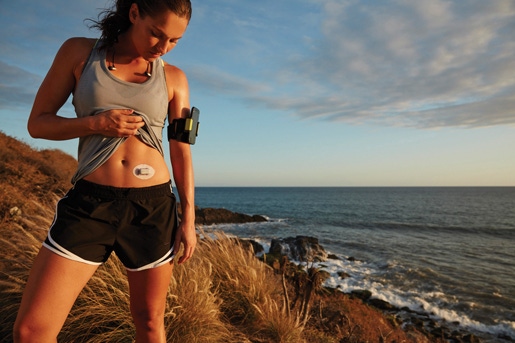Company hopes results will convince private payers to cover sales to this patient group.
August 21, 2017

A new study of Dexcom's G4 Platinum continuous glucose monitor showed that more than half of the participants experienced a 10% or higher reduction in an important indicator for developing diabetes-related complications.
The 24-week study of blood glucose levels in 158 adults who have Type 2 diabetes and inject multiple doses of insulin daily showed significant reductions in Hemoglobin A1c (HbA1c). Mean HbA1c levels dropped by an absolute percent change of 0.8% in the CGM group and 0.5% in the control group, with 73% of the CGM users experiencing a drop of more than 0.5%, the study found.
A mean HbA1c reduction of 0.3% represents a meaningful improvement. Measuring HbA1c indicates how high a patient's blood glucose level has been on average over a period of 8-12 weeks.
The DIAMOND randomized trial did not, however, reveal any changes in hypoglycemia, a dangerous and often hidden effect of the disease. The study participants had extremely low baseline rates of hypoglycemia, limiting the CGM's ability to assess the benefit of measuring it, the company said.
Despite this, Dexcom was crowing over its CGM's performance among patients with Type 2 diabetes, whose blood sugar is usually better controlled than those with Type 1. The company also pointed out that its study results beat those of Abbott's Freestyle Libre Flash CGM in a study last year that showed no HbA1c benefit in a similar patient population.
Unlike the Dexcom G4 Platinum CGM system, the FreeStyle Libre requires the patient to scan the system to view the blood sugar levels and does not provide hypo- or hyperglycemia alerts. Dexcom believes this finding suggests that the alerts with CGM may be a factor in improving glycemic control in patients with type 2 diabetes.
"The REPLACE clinical trial showed strong clinical benefits, including the reduction of hypoglycaemia to unprecedented levels," Abbott spokesperson Jennifer Heth wrote in an email, referring to an Abbott study. "It's important to note that the results of REPLACE showed reduced time in hypoglycaemia, reduction in episodes of hypoglycaemia, and a reduction in nocturnal hypoglycemia--all without an increase in HbA1c."
A patient who uses the Dexcom G4 system inserts a sensor about once a week into the subcutaneous fat and measures glucose concentrations in the interstitial fluid. A reusable transmitter is attached to the sensor and wirelessly transmits glucose values every five minutes to a receiver or smart phone, which displays the glucose values. The receiver provides a graph with glucose trends and alerts when glucose concentrations exceed or fall below user-defined thresholds.
Dexcom also reported higher-than-anticipated patient satisfaction with CGM use, and a sustained high rate of use six months after the study began. The company said it will release the results of the potential health economic impact of the study at a later date.
"We assumed that you needed people who were more technologically savvy to benefit from continuous glucose monitoring and we found out that that simply wasn't true," said Tomás Walker, senior U.S. medical director for Dexcom. "It was great to see how beneficial the technology was."
CGM manufacturers have focused more on patients with Type 1 diabetes because of their changeable blood glucose levels, Walker said. Dexcom is hoping that this study's results will convince private insurers to cover sales to patients with Type 2 diabetes, a population of about 29 million in the United States. Rates of prediabetes have been rising as well, an indicator that Type 2 diabetes might strike more adults in the next several years.
The study results represent the latest good news for San Diego-based Dexcom. In December 2016, FDA decided to expand the indication for the company's G5 mobile CGM system, allowing patients to use the device to guide daily treatment decisions, such as insulin dosing, without pricking their finger first to test their blood sugar.
More recently, startup BigFoot Biomedical chose Abbott over previous CGM partner Dexcom in its quest to simplify diabetes care for patients with Type 1 diabetes.
About 1.25 million U.S. residents have Type 1 diabetes, according to the American Diabetes Association. Diabetes is the seventh leading cause of death in the country.
Nancy Crotti is a contributor to Qmed.
[Image courtesy of DEXCOM]
About the Author(s)
You May Also Like


